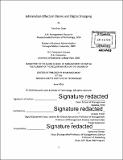| dc.contributor.advisor | Drazen Prelec. | en_US |
| dc.contributor.author | Duan, Tianzhou | en_US |
| dc.contributor.other | Sloan School of Management. | en_US |
| dc.date.accessioned | 2016-10-25T19:53:07Z | |
| dc.date.available | 2016-10-25T19:53:07Z | |
| dc.date.copyright | 2016 | en_US |
| dc.date.issued | 2016 | en_US |
| dc.identifier.uri | http://hdl.handle.net/1721.1/105083 | |
| dc.description | Thesis: Ph. D., Massachusetts Institute of Technology, Sloan School of Management, 2016. | en_US |
| dc.description | Each essay also has its own abstract. Cataloged from PDF version of thesis. | en_US |
| dc.description | Includes bibliographical references. | en_US |
| dc.description.abstract | This dissertation is comprised of three essays studying the effects of presenting various types of information to consumers in online and digital good shopping scenarios. The first essay considers how the choice of business model affects trial rates for mobile apps. Developers can offer consumers free and paid apps via several purchase methods, including in-app purchases. A series of four experiments show that consumers' dislike for firms that charge for mobile apps causes them to prefer free apps from developers who do not offer premium versions. In addition, consumers who are more likely to buy the premium version are also more likely to prefer in-app purchases. The current research demonstrates that the existence of premium versions and the purchase methods used can affect consumer choices toward the free versions of those apps. The second essay investigates how the distribution of a set of product ratings affects trust in those ratings. Online shopping allows consumers to view user ratings for products before purchasing. Since these ratings are provided by the seller, trust becomes a concern. Four experiments demonstrate that the mean and variance of a set of ratings can influence trustworthiness and ultimately purchase intention. Positive ratings are the least trusted, and increasing variance up to a point can improve credibility. The implication is that mostly positive ratings may be trusted more and cause higher rates of purchase than completely positive ratings. The third essay reveals the differences in the effects of knowing about a future or past missed deal on choice of which product to purchase. The popularity of Internet deal websites allows shoppers to discover both past and upcoming sales. Two experiments show that missing a past or future deal for a product can cause consumers to switch to a substitute product. However, future missed deals are weaker than past missed deals at causing this brand switching, especially if the brands are not strong. This is explained by the greater devaluation caused by missing a past deal than a future deal. | en_US |
| dc.description.statementofresponsibility | by Tianzhou Duan. | en_US |
| dc.description.tableofcontents | Would You Like In-App Purchases with That Mobile App? Effect of Premium Versions and Purchase Methods on Free App Trial Rates, by Tianzhou Duan -- How Product Rating Distributions Affect Consumer Trust, by Tianzhou Duan -- The Effects of Future and Past Missed Deals on Brand Switching, by Tianzhou Duan. | en_US |
| dc.format.extent | 80 pages | en_US |
| dc.language.iso | eng | en_US |
| dc.publisher | Massachusetts Institute of Technology | en_US |
| dc.rights | M.I.T. theses are protected by copyright. They may be viewed from this source for any purpose, but reproduction or distribution in any format is prohibited without written permission. See provided URL for inquiries about permission. | en_US |
| dc.rights.uri | http://dspace.mit.edu/handle/1721.1/7582 | en_US |
| dc.subject | Sloan School of Management. | en_US |
| dc.title | Information effects in online and digital shopping | en_US |
| dc.type | Thesis | en_US |
| dc.description.degree | Ph. D. | en_US |
| dc.contributor.department | Sloan School of Management | |
| dc.identifier.oclc | 960804701 | en_US |
